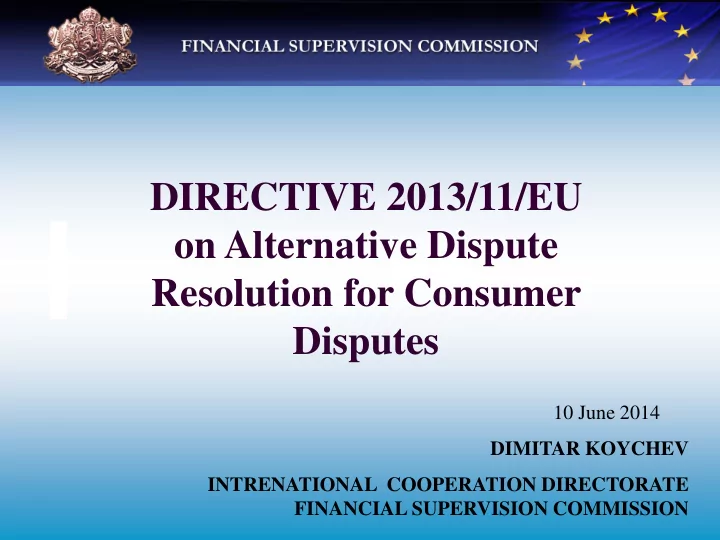

DIRECTIVE 2013/11/EU on Alternative Dispute Resolution for Consumer Disputes 10 June 2014 DIMITAR KOYCHEV INTRENATIONAL COOPERATION DIRECTORATE FINANCIAL SUPERVISION COMMISSION
Timing • Transposition: by 9 July 2015 • By 9 January 2016 the lists of ADRs which fall within the scope of the Directive and comply with the quality requirements must be sent to EC
Aim • To strengthen consumers’ confidence in the internal market; • To ensure access to simple, efficient, fast and low-cost ways of resolving domestic and cross-border disputes which arise from sales or service contracts ; • To diminish the diversity in national ADR arrangements by setting a minimum level of requirements This Directive is a minimum harmonization act
Scope The Directive applys to procedures for the out-of- court resolution of disputes through the intervention of an ADR entity which proposes or imposes a solution or brings the parties together with the aim of facilitating an amicable solution.
Definitions • ‘consumer’ - any natural person who is acting for purposes which are outside his trade, business, craft or profession; • ‘trader’ - any natural or legal person irrespective of whether privately or publicly owned, who is acting, including through any person acting in his name or on his behalf, for purposes relating to his trade, business, craft or profession; Also: ‘sales contract’ , ‘service contract’ , etc.
Access to ADRs There should be a possibility the disputes covered by the Directive to be submitted to an ADR
Requirements for ADR entities • Expertise • Independence • Impartiality • Transparency
Requirements for ADR procedures • Transparency • Effectiveness • Fairness
Competent authorities Competent authorities for the ADR entities must be designated. Each competent authority shall assess, whether the dispute resolution entities qualify as ADR entities and if they comply with the quality requirements. If so the ADR is included in a list, sent to the EC which makes the list public.
Thank you for the attention!
Recommend
More recommend